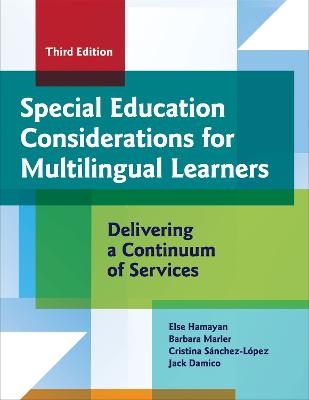
Special Education Considerations for Multilingual Learners
Brookes Publishing Co (Verlag)
978-1-68125-628-3 (ISBN)
Multilingual learners in Grades K–12 are often overidentified or underidentified for special education. The third edition of this groundbreaking text offers a better way to meet the needs of multilingual learners: by creating a culturally and linguistically responsive multi-tiered system of support (MTSS) and implementing a continuum of services that meets the needs of the whole child.
Shifting away from traditional ways that schools address the needs of students who experience challenges, the new edition of this text takes a strengths-based approach to supporting multilingual students and focuses on the complex issues that affect a multilingual learner's development. Chapters have been fully updated to reflect the latest best practices and reorganized to better align with MTSS. Educators and other school-based professionals will be fully prepared to:
Form collaborative MTSS teams that blend the diverse expertise of staff members
Evaluate and enhance the learning environment for multilingual learners
Gather extensive data about six critical factors in students’ home and school life, from previous schooling experiences to cross-cultural factors
Authentically assess the strengths of multilingual learners
Create a continuum of services that addresses the individual needs of each student
Plan effective instruction and intervention using a multilingual lens
Monitor the effectiveness of support strategies and programming for multilingual learners
PRACTICAL FEATURES:
MTSS team activities to support professional learning
Templates, a rating scale, and other reproducible tools
Real-world examples from the field
Discussion questions to help teams apply the concepts to their own student population
Foreword
Preface
About the Online Resources
Chapter 1: A FRAMEWORK FOR CONSIDERING THE SPECIAL NEEDS OF MULTILINGUAL LEARNERS
Key Concepts
Reasons for the Misidentification of Special Needs
Developing a Multi-Tiered System of Supports
The Need to Provide Relevant Services in a Timely Manner
Some Myths Regarding Multilingual Learners and Special Education
The Continuum of Services Framework
Questions for Reflection and Action
Chapter 2: A COLLABORATIVE MODEL OF INFORMATION GATHERING AND SERVICE PROVISION
Key Concepts
Getting a Head Start
Challenges to This Continuum of Services
Responsibilities of MTSS Teams
Makeup of MTSS Teams
Building Professional Bridges across Specializations
Characteristics of an Effective MTSS Team
How to Form Effective MTSS Teams
What MTSS Teams Can Accomplish
An Innovative Approach
Questions for Reflection and Action
Chapter 3: THE LEARNING ENVIRONMENT CREATED FOR MULTILINGUAL LEARNERS
Key Concepts
Key Factors in the Learning Environment
Evaluating the Adequacy of the Learning Environment
Enhancing the Learning Environment
Considering the Six Integral Factors
Questions for Reflection and Action
Chapter 4: PERSONAL AND FAMILY FACTORS
Key Concepts
Key Factors in the Student’s Personal and Family Background
Information Gathering
Systemic Support Strategies
Specific Support Strategies
Questions for Reflection and Action
Chapter 5: PHYSICAL AND PSYCHOLOGICAL FACTORS
Key Concepts
Key Physical and Psychological Factors
Information Gathering
Systemic Support Strategies
Specific Support Strategies
Questions for Reflection and Action
Chapter 6: PREVIOUS SCHOOLING FACTORS
Key Concepts
Key Factors in Previous Schooling
Information Gathering and Evaluating the Adequacy of Previous Schooling
Systemic Support Strategies
Specific Support Strategies
Questions for Reflection and Action
Chapter 7: ORAL LANGUAGE AND LITERACY DEVELOPMENT
Key Concepts
Key Factors in Oral Language Development
Key Factors in Literacy Development
Understanding the Relationship between Students’ Home Language and English
Language Use Patterns
Information Gathering What to Assess in Oral Language and Literacy How to Assess Oral Language and Literacy Comparisons with Peers
Systemic Learning Support Strategies
Specific Learning Support Strategies
Questions for Reflection and Action
Chapter 8: ACADEMIC PERFORMANCE
Key Concepts
Key Factors in Academic Performance
Gathering Information about Academic Performance
Systemic and Specific Learning Support Strategies
Questions for Discussion
Questions for Study Groups
Chapter 9: CROSS-CULTURAL FACTORS
Key Concepts
Key Characteristics of Culture
Information Gathering and Evaluating Cultural Difference Factors
Systemic Support Strategies
Specific Support Strategies
Questions for Reflection and Action
Chapter 10: DESCRIBING BEFORE IDENTIFYING: WHEN SPECIFIC CHALLENGES PERSIST FOR SOME MULTILINGUAL LEARNERS
Key Concepts
The Importance of Describing before Identifying
The Process of Data Collection and Explanation
Questions for Reflection and Action
Chapter 11: DELIVERING A CONTINUUM OF SERVICES
Key Concepts
Providing Support in a Timely Manner
A Solution-Seeking Approach Based on Meaning
A Forum for Crafting and Evaluating Interventions
Key Principles for Crafting and Evaluating Interventions
Validating Difficulties and Intervening across Contexts
Home Language and Culture as Resources
A Sample Process
Questions for Reflection and Action
Chapter 12: PUTTING IT ALL TOGETHER
Key Concepts
Identification of Multilingual Learners Who Experience Significant Challenges in School
Anticipating and Addressing Predictable Challenges
Creating a Supportive and Enriched Learning Environment
Questions for Reflection and Action
Glossary
References
Index
| Erscheinungsdatum | 31.08.2022 |
|---|---|
| Verlagsort | Baltimore |
| Sprache | englisch |
| Maße | 241 x 284 mm |
| Gewicht | 363 g |
| Themenwelt | Schulbuch / Wörterbuch ► Wörterbuch / Fremdsprachen |
| Geisteswissenschaften ► Sprach- / Literaturwissenschaft ► Sprachwissenschaft | |
| Sozialwissenschaften ► Pädagogik ► Sonder-, Heil- und Förderpädagogik | |
| ISBN-10 | 1-68125-628-2 / 1681256282 |
| ISBN-13 | 978-1-68125-628-3 / 9781681256283 |
| Zustand | Neuware |
| Haben Sie eine Frage zum Produkt? |
aus dem Bereich


